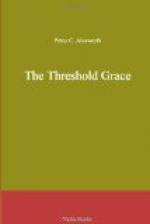To isolate an experience is to misinterpret it. We may even completely classify experiences, and yet completely misunderstand experience. To understand life at all we must get beyond the incidental and the alternating. Life is not a series of events charged with elements of contrast, contradiction, or surprise. It is a deep, coherent, and unfaltering process. And one feels that it was something more than the chance of the moment that led the singer of old to weave the tears and the rejoicings of men’s lives into a figure of speech that stands for unity of process, even the figure of the harvest.
They that sow in tears shall reap in joy. The sweep of golden grain is not some arbitrary compensation for the life of the seed cast so lavishly into the ground, and biding the test of darkness and cold. It is the very seed itself fulfilled of all its being. Even so it is with the sorrows of these hearts of ours and the joy unto which God bringeth us. He does not fling us a few glad hours to atone for the hours wherein we have suffered adversity. There is a deep sense in which the joys of life are its ripened sorrows.
They that sow in tears.... He that goeth forth and weepeth. These are not the few who have been haunted by apparent failure, or beset with outwardly painful conditions of service. They are not those who have walked in the shadow of a lost leader, or toiled in the grey loneliness of a lost comrade or of a brother proved untrue. For apparent failure, outward difficulty and loneliness, often as we may have to face them, are, after all, only the accidents of Godward toil. And if the bearer of seed for God’s great harvest should go forth to find no experience of these things, still, if he is to do any real work in the fields of the Lord, he must go forth weeping. He must sow in tears. Let a man be utterly faithful and sincere, let him open his heart without reserve to the two great claims of the ideal and sympathy, and he shall come to know that he has not found the hidden meaning of daily service, nor learned how he can best perform that service, until he has tasted the sorrow at the heart of it. The tears that are the pledge of harvest are not called to the eyes by ridicule or opposition. They are not the tears of disappointment, vexation, or impotence. They are tears that dim the eyes of them that see visions, and gather in the heart of them that dream dreams. To see the glory of God in the face of Jesus Christ and the blindness of the world’s heart to that glory; to see unveiled the beauty that should be, and, unveiled too, the shame that is; to have a spiritual nature that thrills at the touch of the perfect love and life, and responds to every note of pain borne in upon it from the murmurous trouble of the world,—this is to have inward fitness for the high work of the Kingdom. Yes, and it is the pledge that this work shall be done. There is such a thing as artistic grief. There is the vain and languorous pity of aestheticism. Its robe of sympathy is wrapped about itself and bejewelled with its own tears. And it never goes forth. You never meet it in ‘the darkness of the terrible streets.’




